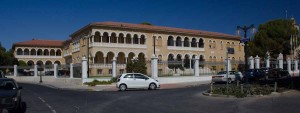Do I kiss the ring?
October 1st, 2011
Lunch with the Archbishop of Cyprus
September 28 was simply too full for one blog entry. I must stretch it to three posts. We had lunch with the Archbishop, listened to Sufi Muslims praying at the tomb of St. Barnabas (“They said that Jesus will return this year, and saints like Barnabas will rise at that time to help him rule for 40 years”), and a late dinner with Father Gabriel and some of his spiritual children at the monastery (“Please, pass the pigeon”).
Our audience with Chrysostomos II, Archbishop of Cyprus, was at noon. Faidon Papadopoulos, who heads the Ministry of Education’s division for theological education, served as our interpreter. I had been considering the proper response if the archbishop extended his hand so that I should kiss his ring. Fortunately, His Beatitude is accustomed to foreigners and extended his hand for a handshake. He listened to Papadopoulos translate for me and gave his blessing on my research, telling Papadopoulos to give me whatever help I needed. With that blessing, I have permission to go to the library in the archbishopric and read whatever they have, including archival material. I may also take photos in churches, like the Cathedral of St. John.
Why we pray to saints.
Papadopoulos took us to see several meeting rooms with lavish paintings of Barnabas. While commenting on one set of paintings, he explained prayer to us. “People ask why we kiss icons and pray to the saints. We believe in Jesus of course. Jesus is God. But we don’t go to him with every request. We ask his assistants, the saints, who are extremely close to God. Because they are humans, we can talk with them more easily. They are like older brothers. We bring our requests to them and ask them to help us.”
It reminds me of governmental organization. We do not go to the president of the United States with matters of daily life. We go to lesser officials who have delegated authority to take care of matters within their own spheres of influence. Going to them does not diminish the office of the president. I do not think that one can grasp this concept of prayer without understanding theosis.
Theosis. Orthodox Christians believe that, through prayer, fasting, meditation and good works, we become more and more like God, a process called theosis (theos is the Greek word for God). They take seriously 2 Peter 1:3-4: “His divine power has given us everything needed for life and godliness, … he has given us… his precious and very great promises, so that through them you may escape from the corruption that is in the world … and may become participants of the divine nature.” In their opinion, personal union with God, not academic degrees, equips people to be spiritual leaders. They need a spiritual father for guidance through levels of spiritual enlightenment. Saints have through extreme discipline achieved union with God to such a degree that even after death they continue their role of caring for and guiding their spiritual children.
Lunch with the Archbishop. Papadopoulos took us to Gregorious, Bishop of Mesaoria (Church of Cyprus Director of Inter-Church Relations and European Affairs Office). This younger bishop went to his bookshelf, got three books with beautiful color photographs of icons and churches, and he gave them all to me. Papadopoulos also got a CD containing two books, so that I can look at the material on my computer. Doing research on Barnabas has its rewards!
After answering the phone, Gregorious said us, “His Beatitude requests your presence at lunch.” One does not say “No” to the Archbishop. Of course, we considered it an honor to be included. Lynne was the only woman at the table.
The bowl on my plate contained soup that was the same color as the inside of the bowl. I did not have on my reading glasses, so I did not notice the soup. I thought that perhaps I should set the bowl to the side and place some salad on my plate. But, as I picked up the bowl, the man to my right said, “Eat. Soup.” To my great relief, I had not spilled it all over the table. I laughed at myself and picked up the soupspoon. I whispered to Lynne the big mess I almost made, only to discover that she came closer than I. She was going to tip her bowl to see what the deal was with her plate.
The soup was made from sour milk mixed with crushed wheat, lemon juice and yogurt. This mixture is allowed to dry in the sun and then broken into pieces and stored. Later, they mix it with water or chicken stock, add halloumi cheese, and produce a distinctly Cypriot soup called trahana. It is tangy and quite good. http://kopiaste.org/2009/12/cypriot-trahanas-soup/
We had thought that we might only be at the Archbishopric for 15 minutes—a courtesy call. In fact, we were there for over two hours. We are not used to hanging around with national leaders, but we did just fine. Lynne has taught me well—except for the soup.
For Lynne’s version, see http://cyprusreflections.wordpress.com/
Posted in Uncategorized | Comments Off on Do I kiss the ring?


